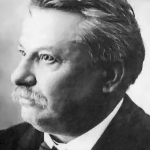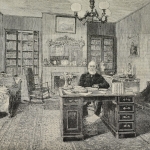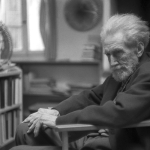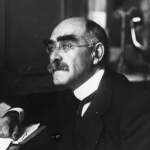From there he sailed farther on, and sadder.
Standing at the stern he looked out darkly
till the Cyclopes’ land turned slowly into view.
He saw the island’s unfarmed peak
that rose up sharp and high as if to mark itself
apart, and watched a fire’s smoke unfold
from where a shepherd lulled it.
But those who bent to pull the oars
saw shadows on the bruise of sea,
the shadows of those Cyclopes, as still
along the shore as if they, too, were hills.
The old man heard his heart beat
like the yelping of a dog, asleep.
My dream was neither more nor any less
than what it was: a dream. And wind,
and smoke, from burning wood. But truth
is the only good. He spoke thus to himself
and then remembered the two sirens
with their slope of petaled meadow
in the calm of sea. Again he heard
their honeyed song:
Men, stop your ship. There’s no one on the earth
who passes by without first coming near ... and no one
who has listened without loving what he hears ...
nor does he turn away without perceiving more:
We know of all that happens on your worldly shores ...
And then again remembering, he understood
that Circe would have envied him the only
precious thing: knowing. It’s what she must
have longed for in her den of spells, and beasts.
But humankind, endowed with thought,
has always been compelled to stop, to listen in—
although he’d lose his home and friends, although
his bones would glisten in their withered shell of skin.
The hero who was old now turned to all his old
and oar-bound men:
Let’s sail toward the only good: the singing
of the sirens. I want to hear their sound without the ropes
around my wrists. To raise my white-haired head
as if a sail for the ship, to lift it up—released! and know
the whole of what will happen, from the sirens’ lips.
With this he roused the hearts of those
who beat the water back with oars; he’d sparked in them
that same pure thirst to know the earth: if vines
on terraced rock had brought forth fruit this year,
if someone’s cow had given birth, how much
the neighbor’s crops were worth, and if his wife
were weaving now, or walking toward the well.
Translated from the Italian, below
____
“Le Sirene”
Indi più lungi navigò, più triste.
E stando a poppa il vecchio Eroe guardava
scuro verso la terra de’ Ciclopi,
e vide dal cocuzzolo selvaggio
del monte, che in disparte era degli altri,
levarsi su nel roseo cielo un fumo,
tenue, leggiero, quale esce su l’alba
dal fuoco che al pastore arse la notte.
Ma i remiganti curvi sopra i remi
vedeano, sì, nel violaceo mare
lunghe tremare l’ombre dei Ciclopi
fermi sul lido come ispidi monti.
E il cuore intanto ad Odisseo vegliardo
squittiva dentro, come cane in sogno:
Il mio sogno non era altro che sogno;
e vento e fumo. Ma sol buono è il vero.
E gli sovvenne delle due Sirene.
C’era un prato di fiori in mezzo al mare.
Nella gran calma le ascoltò cantare:
Ferma la nave! Odi le due Sirene
ch’hanno la voce come è dolce il miele;
ché niuno passa su la nave nera
che non si fermi ad ascoltarci appena,
e non ci ascolta, che non goda al canto,
né se ne va senza saper più tanto:
ché noi sappiamo tutto quanto avviene
sopra la terra dove è tanta gente!
Gli sovveniva, e ripensò che Circe
gl’invidiasse ciò che solo è bello:
saper le cose. E ciò dovea la Maga
dalle molt’erbe, in mezzo alle sue belve.
Ma l’uomo eretto, ch’ha il pensier dal cielo,
dovea fermarsi, udire, anche se l’ossa
aveano poi da biancheggiar nel prato,
e raggrinzarsi intorno lor la pelle.
Passare ei non doveva oltre, se anco
gli si vietava riveder la moglie
e il caro figlio e la sua patria terra.
E ai vecchi curvi il vecchio Eroe parlò:
Uomini, andiamo a ciò che solo è bene:
a udire il canto delle due Sirene.
Io voglio udirlo, eretto su la nave,
né già legato con le funi ignave:
libero! alzando su la ciurma anela
la testa bianca come bianca vela;
e tutto quanto nella terra avviene
saper dal labbro delle due Sirene.
Disse, e ne punse ai remiganti il cuore,
che seduti coi remi battean l’acqua,
saper volendo ciò che avviene in terra:
se avea fruttato la sassosa vigna,
se la vacca avea fatto, se il vicino
aveva d’orzo più raccolto o meno,
e che facea la fida moglie allora,
se andava al fonte, se filava in casa.


















Comment form: